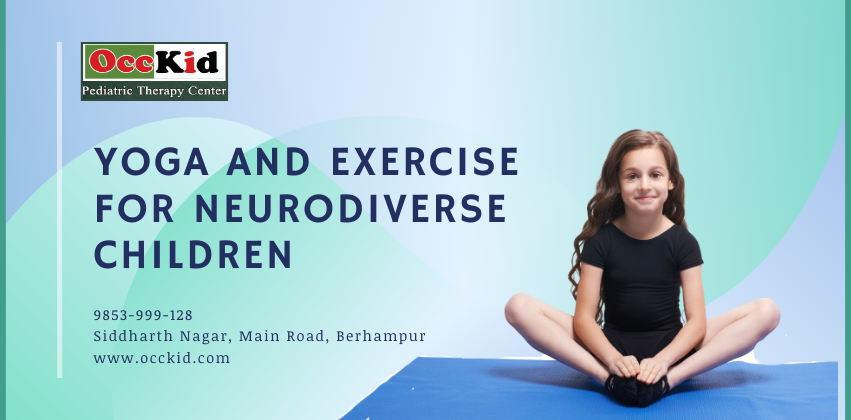In to day’s fast-paced world, the importance of physical and mental well-being cannot be overstated, especially for neurodiverse children. Neurodiversity encompasses a range of conditions like Autism Spectrum Disorder (ASD), ADHD, and sensory processing disorders, which affect how individuals perceive and interact with the world around them. While each child’s journey is unique, incorporating yoga and physical exercise into their routine has proven to be a game-changer, fostering physical, emotional, and cognitive development.

The Physical Benefits
For neurodiverse children, movement is not just about staying active; it’s a cornerstone for building essential motor skills. Many neurodiverse children experience challenges with coordination, balance, and muscle tone. Regular physical exercise, such as climbing, running, or engaging in structured play, helps improve gross motor skills. Yoga, with its gentle stretches and poses, enhances flexibility, strength, and posture—all critical components for physical development.
Moreover, physical activity promotes cardiovascular health, supports healthy weight management, and builds endurance. These benefits can significantly enhance a child’s ability to participate in daily activities and increase their overall energy levels.
Enhancing Emotional Regulation
One of the most profound benefits of yoga is its ability to support emotional regulation. Neurodiverse children often face challenges in managing emotions and coping with stress. Yoga teaches mindfulness, breathing techniques, and relaxation methods, which can help children calm their minds and bodies.
Deep breathing exercises, for instance, activate the parasympathetic nervous system, promoting a state of relaxation. This practice is particularly beneficial for children who experience sensory overload or anxiety, providing them with tools to self-regulate and reduce meltdowns.
Boosting Cognitive Function
Physical exercise has a direct impact on cognitive abilities. Activities that involve coordination, such as yoga poses or balancing exercises, stimulate the brain’s neural pathways, improving focus, attention, and memory. For children with ADHD, engaging in aerobic exercises has been shown to enhance executive functioning, helping them with planning, organization, and impulse control.
Yoga’s meditative aspects also nurture cognitive growth. By encouraging stillness and concentration, it helps children develop better attention spans and mental clarity, enabling them to navigate academic and social challenges with greater ease.
Fostering Social Skills
Group activities, whether it’s a yoga class or a team sport, provide neurodiverse children with valuable opportunities to interact with peers. These settings teach cooperation, turn-taking, and effective communication, essential skills for building relationships.
Yoga classes, in particular, emphasize non-competitive participation, creating a safe and inclusive environment. This fosters a sense of belonging and boosts self-esteem as children achieve small milestones, such as mastering a pose or completing a sequence.
Tailoring Practices for Neurodiverse Needs
Every neurodiverse child has unique strengths and challenges, making it essential to tailor physical activities to their individual needs. For instance:
- Yoga: Simplify poses and use visual aids or sensory-friendly props to make sessions engaging and accessible.
- Sensory Integration Exercises: Incorporate activities like swinging, jumping, or crawling to address sensory processing needs.
- Structured Routines: Consistency is key. A predictable schedule helps children feel secure and more willing to participate.
Empowering Parents and Caregivers
Parents and caregivers play a vital role in introducing and maintaining a child’s physical activity routine. By practicing yoga or engaging in exercises together, families not only bond but also model healthy habits. Moreover, celebrating small victories reinforces positive behavior and motivates children to continue exploring their physical potential.
Conclusion
Yoga and physical exercise are more than just activities; they are transformative tools that nurture the holistic development of neurodiverse children. By fostering physical health, emotional resilience, cognitive abilities, and social connections, these practices pave the way for a brighter and more inclusive future.
As we continue to embrace neurodiversity, let’s champion the integration of yoga and physical exercise in therapeutic and educational settings, ensuring every child has the opportunity to thrive. Whether it’s the calm of a yoga mat or the thrill of a playground, movement holds the power to unlock potential and bring joy to neurodiverse lives.
Contact Details for Occkid Pediatric Therapy Center
- Website: www.occkid.com
- Contact Number: 9853–999–128
- Address: Occkid Pediatric Therapy Center, Siddharth Nagar, Main Road, Berhampur
For more information or to schedule a consultation, please visit our website or contact us directly.